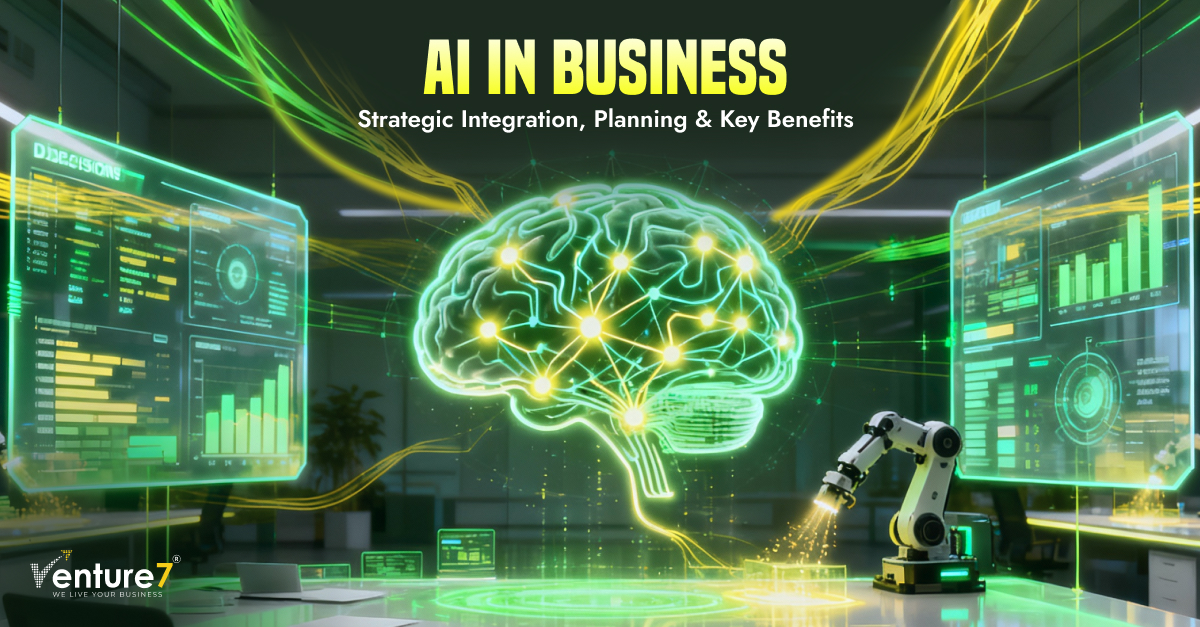Introduction
Artificial Intelligence (AI) has evolved from a futuristic concept to a strategic necessity for businesses across industries. Today, AI is no longer confined to experimental projects or isolated automation initiatives; it is central to shaping competitive advantage, improving operational efficiency, and driving growth.
For enterprise leaders, understanding how to integrate AI strategically is crucial. A well-crafted business AI strategy ensures that AI initiatives align with organizational goals, maximize ROI, and deliver measurable value. In this guide, we explore the practical framework for AI adoption, the benefits of AI in business, strategic planning approaches, and real-world insights that can help organizations make informed decisions.
What Is an AI Business Strategy?
An AI business strategy is a roadmap that outlines how an organization leverages artificial intelligence to achieve strategic objectives. It is more than deploying AI tools—it involves identifying business opportunities, aligning AI initiatives with company goals, and ensuring data, technology, and talent readiness.
Key components of an AI business strategy include:
- Vision & Goals: Defining how AI will contribute to growth, efficiency, and innovation.
- Data Strategy: Ensuring high-quality, actionable data to power AI models.
- Technology Infrastructure: Selecting AI platforms, cloud services, and tools that scale.
- Talent & Skills: Building teams capable of implementing and managing AI solutions.
- Governance & Ethics: Establishing frameworks for responsible AI use.
According to a 2024 McKinsey report, enterprises with a clear AI strategy are three times more likely to achieve above-average revenue growth compared to companies without one.
The Role of AI in Strategy & Execution
AI transforms how businesses approach both strategy and execution. From market analysis to customer experience optimization, AI enables faster, data-driven decision-making.
Strategic areas AI impacts include:
- Predictive Analytics: Forecasting demand, market trends, and customer behavior.
- Operational Efficiency: Automating repetitive tasks to reduce cost and error rates.
- Personalization & Customer Insights: Leveraging AI-driven insights to enhance customer engagement.
- Innovation Acceleration: Identifying new revenue streams or products faster.
For example, retail giants like Amazon use AI-driven recommendation engines to personalize customer experiences, contributing significantly to sales and retention. Similarly, financial institutions deploy AI to detect fraud in real-time, mitigating risks and losses.
Benefits of a Successful AI Strategy
Implementing a structured AI strategy can create tangible benefits for enterprises, ranging from operational improvements to strategic growth.
Major benefits include:
- Increased Efficiency and Productivity
AI automates routine tasks, freeing human resources for strategic work. Businesses can reduce operational costs while increasing throughput and accuracy. - Data-Driven Decision-Making
AI enables predictive and prescriptive analytics, transforming raw data into actionable insights. Executives can make faster, more informed decisions backed by real-time intelligence. - Revenue Growth and Competitive Advantage
AI helps identify market opportunities, optimize pricing strategies, and deliver personalized offerings, driving sales and customer loyalty. - Enhanced Customer Experience
AI tools like chatbots, recommendation engines, and sentiment analysis improve engagement and satisfaction, providing measurable ROI on digital initiatives.
Gartner predicts that by 2026, more than 70% of organizations will operationalize AI in at least one critical business function, making it a core driver of competitiveness.
The Impact of AI Tools on Strategic Planning
AI tools enhance the strategic planning process in several ways:
- Scenario Modeling: AI can simulate multiple business scenarios, helping executives plan for uncertainties.
- Market Insights: Natural language processing (NLP) and machine learning can analyze market trends, competitor activity, and customer feedback.
- Resource Allocation: Predictive algorithms optimize workforce deployment, supply chain management, and capital expenditure.
Example: A global logistics company implemented AI-based route optimization, reducing fuel costs by 15% while improving delivery times. The AI system continuously learns from traffic, weather, and shipment patterns to provide real-time recommendations.
The Impact of AI on Business Strategy Today
AI is no longer an experimental tool; it is a strategic lever shaping enterprise growth. Companies that fail to integrate AI risk losing market share and efficiency. Key trends include:
- Democratization of AI: Low-code/no-code AI platforms allow broader adoption across departments.
- AI-Driven Decision Support: Executives are increasingly relying on AI insights for budgeting, planning, and resource management.
- Integration with Cloud & IoT: AI embedded in cloud infrastructure and IoT networks creates smarter, connected operations.
How Are Businesses Using AI?
Enterprises are deploying AI across multiple functions:
- Marketing & Sales: Personalized recommendations, predictive lead scoring, campaign optimization.
- Operations: Process automation, supply chain optimization, quality assurance.
- Finance: Fraud detection, risk modeling, intelligent forecasting.
- Human Resources: Talent acquisition, performance analysis, workforce planning.
Case Study: A U.S.-based healthcare provider implemented AI-driven predictive analytics to manage patient admissions, reducing emergency room overcrowding by 20% and improving patient satisfaction.
How Can AI Support Your Business Needs?
AI can address diverse enterprise needs, from operational efficiency to innovation acceleration. Practical applications include:
- Automating Routine Tasks: Reduce errors and free up employees for high-value work.
- Enhancing Customer Engagement: Deliver personalized experiences and real-time support.
- Optimizing Operations: Streamline supply chains, logistics, and resource allocation.
- Driving Strategic Decisions: Leverage predictive insights for market expansion and investment planning.
Key Insight: Organizations that align AI initiatives with business priorities achieve faster ROI and more sustainable transformation.
What is AI and How is it Used in Business Development?
Artificial Intelligence refers to computer systems capable of performing tasks that typically require human intelligence. In business development, AI is applied to:
- Lead Generation: Identifying prospects based on behavioral data and predictive scoring.
- Market Research: Analyzing trends, competitor strategies, and consumer sentiment.
- Decision Support: Providing actionable insights to guide strategy, pricing, and expansion.
Example: AI-powered CRM platforms can automate lead nurturing, ensuring personalized engagement and higher conversion rates.
Implementation Roadmap for Businesses
A structured AI adoption roadmap ensures measurable outcomes and minimized risks. Key steps include:
- Assess Readiness: Evaluate data infrastructure, talent, and processes.
- Define Objectives: Identify where AI can deliver maximum impact aligned with business goals.
- Select Technology & Partners: Choose AI tools, platforms, and consulting expertise.
- Pilot Projects: Start with small-scale initiatives to validate value and ROI.
- Scale & Integrate: Expand successful pilots across departments, ensuring integration with business systems.
- Monitor & Optimize: Continuously measure AI performance, accuracy, and business impact.
Venture7® helps enterprises define and implement AI roadmaps that balance strategic vision with operational execution, ensuring measurable business benefits.
Challenges & Considerations
While AI offers significant potential, enterprises must address challenges:
- Data Quality & Availability: Poor-quality or siloed data can hinder AI performance.
- Talent Gap: Skilled AI professionals are in high demand, requiring investment in hiring and upskilling.
- Governance & Compliance: Ethical AI use and regulatory adherence are critical for risk management.
- Change Management: Adoption requires cultural shifts and stakeholder buy-in.
Tip: A phased, well-governed approach mitigates risks and maximizes ROI.
Future of AI in Business
The future of AI is marked by deeper integration, smarter automation, and more strategic applications:
- Generative AI for Decision Support: AI systems will generate insights, reports, and strategic recommendations autonomously.
- Hyper-Personalization: AI-driven experiences tailored to individual customer behaviors will become standard.
- AI-Augmented Workforce: Human-AI collaboration will enhance creativity, problem-solving, and innovation.
- Sustainability & ESG: AI will optimize resource utilization, helping companies achieve ESG goals.
By 2030, AI is projected to contribute up to $15 trillion to the global economy, highlighting its transformative potential for businesses of all sizes.
Conclusion: Consulting Venture7® for AI Success
Strategic AI integration is no longer optional—it is essential for enterprises seeking efficiency, innovation, and competitive advantage. By developing a robust business AI strategy, organizations can unlock measurable ROI, improve operational performance, and accelerate growth.
Venture7® partners with enterprises to design, plan, and implement AI solutions tailored to strategic objectives. From AI adoption roadmaps to execution and governance, we help companies harness AI for sustainable business transformation.
Take Action: Consult Venture7® AI Development Services today to explore how AI can drive strategic advantage for your organization. Our team of AI experts delivers actionable insights, scalable solutions, and measurable outcomes that empower business leaders to succeed in the digital era. Book AI Demo.





